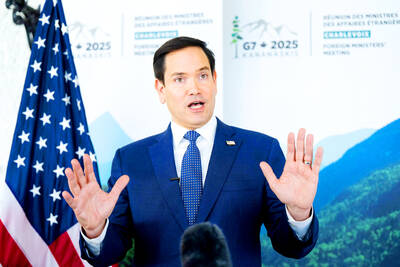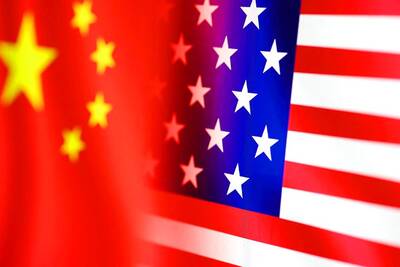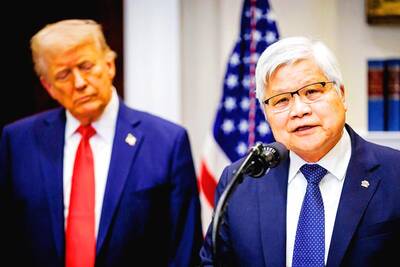Amid raucous protests by unions and opposition members, three state-run companies changed their names yesterday, dropping "China" references and including "Taiwan" in their official titles.
Government officials said the move was part of a bid to avoid confusion among members of the international community, which could mistake Taiwan for China.
Chinese Petroleum Corp (CPC, 中國石油) and China Shipbuilding Corp (CSBC, 中國造船) approved their name changes in board meetings yesterday.
CPC has been renamed "CPC Corp, Taiwan" (
The board of Chunghwa Post Co (
"The chairman [of the meeting] ruled today that the number of board directors present has met the requirements of conference rules," Chunghwa Post Co chairman Lai Ching-chyi (賴清祺) said, after spending almost eight hours trying to hold the board meeting and switching venues four times. "The conference is, therefore, legal."
That the decision was made without three board members who represent the Chunghwa Post Workers Union infuriated some employees of one of the nation's oldest state-run companies.
Lai said that company had informed the union that the meeting would be held at the Ministry of Transportation and Communications' (MOTC) headquarters.
Board members were waiting for the union's representatives for at least 30 minutes before the meeting began, Lai added.
The union's board members arrived at the MOTC building yesterday afternoon intending to join the meeting, but they were blocked at the entrance by police.
"Congratulations," Chunghwa Post Workers Union chairman Tsai Liang-chuan (
Tsai added that the union would launch a protest next Monday. One of the union's board members told reporters that he had filed a lawsuit against Chunghwa Post at the Taipei District Court, but did not provide details.
The postal service board had been scheduled to hold a routine board meeting yesterday at 9am, but the members were unable to reach a decision in the morning, as workers broke into the meeting room and interrupted the proceedings. The meeting's chairman dismissed the board at 12:30pm.
Board directors representing the government left the headquarters and tried to locate different venues to meet.
Lai said yesterday after the meeting that the name change would facilitate delivery of mail in the future. Some mail is sent to China by mistake, he said, because mail personnel in other countries often confuse Taiwan with China.
He also said that replacing the names on the billboards as well as other items would cost the company only approximately NT$67 million (US$2.1 million).
Tsai said, however, that the expenses would be more than the sum Lai claimed, if changing the titles of personal account books and postal delivery trucks are taken into account.
Tsai added that Taiwan is not one of the members of the Universal Postal Union (UPU) and had to be informed about information updates from the union through South Korea.
Given the pressure from China, Taiwanese stamps may not be recognized by other nations, which would result in a cross-strait postal delivery crisis, he said.
Meanwhile, adding the word "corporation" to the English titles of "CPC Corp, Taiwan" and "CSBC Corp, Taiwan" was not redundant, Minister of Economic Affairs Steve Chen (陳瑞隆) said, as the acronyms have become recognized corporate logos.
The two state-run enterprises both held board meetings at 2pm yesterday to discuss the name change issues, and the new names were immediately endorsed by the ministry, which is in charge of the two firms.
"Since CPC and CSBC are state entities, the name change can help them avoid confusion outside Taiwan. We believe the new titles will boost their corporate image, competitiveness and market share," Steve Chen told a press conference.
As some employees oppose the name change campaign, Chen said he had talked to the leaders of the two firms' labor unions on Thursday and promised that their rights and interests would be protected, which he said helped the board meetings proceed smoothly yesterday.
CPC vice president Tsao Mihn (曹明) said the board of directors yesterday demanded that employees' benefits not be sacrificed and that corporate performances be reviewed every six months to determine whether the new title brought any negative impact on operations.
CPC's new name already took effect yesterday afternoon, as the firm is 100 percent owned by the government. The ministry said that new signs could be put up at gas stations, starting Monday at the earliest.
CSBC, meanwhile, will have to seek shareholder approval for a new name, as it is 2 percent controlled by private shareholders and 98 percent by the government.
The shareholder meeting is scheduled for March 1, CSBC president Fan Kuang-nan (
Fan said changing CSBC's name could cost around NT$20 million, as it only needs to send notices to holders of its 30,000 contracts, instead of changing its documents.
CSBC is not worried that buyers will be affected or China will interfere, as it is a "seller's market" in the shipbuilding industry, and the 54 ships currently under construction will still obtain a good price on the market, he added.
Premier Su Tseng-chang (蘇貞昌) yesterday said that the name change of the three state-owned companies would not cost much and would not jeopardize employees' legal rights.
The name changes will avoid potential confusion for foreigners and will make the firms more competitive, because it will become easier to identify them with Taiwan, Su said during a press conference.

Taiwan’s Lee Chia-hao (李佳豪) on Sunday won a silver medal at the All England Open Badminton Championships in Birmingham, England, a career best. Lee, 25, took silver in the final of the men’s singles against world No. 1 Shi Yuqi (石宇奇) of China, who won 21-17, 21-19 in a tough match that lasted 51 minutes. After the match, the Taiwanese player, who ranks No. 22 in the world, said it felt unreal to be challenging an opponent of Shi’s caliber. “I had to be in peak form, and constantly switch my rhythm and tactics in order to score points effectively,” he said. Lee got

‘CROWN JEWEL’: Washington ‘can delay and deter’ Chinese President Xi Jinping’s plans for Taiwan, but it is ‘a very delicate situation there,’ the secretary of state said US President Donald Trump is opposed to any change to Taiwan’s “status quo” by force or extortion and would maintain that policy, US Secretary of State Marco Rubio told the Hugh Hewitt Show host on Wednesday. The US’ policy is to maintain Taiwan’s “status quo” and to oppose any changes in the situation by force or extortion, Rubio said. Hewitt asked Rubio about the significance of Trump earlier this month speaking with Taiwan Semiconductor Manufacturing Co (台積電) chairman C.C. Wei (魏哲家) at the White House, a meeting that Hewitt described as a “big deal.” Asked whether the meeting was an indication of the

‘RELATIVELY STRONG LANGUAGE’: An expert said the state department has not softened its language on China and was ‘probably a little more Taiwan supportive’ China’s latest drills near Taiwan on Monday were “brazen and irresponsible threats,” a US Department of State spokesperson said on Tuesday, while reiterating Washington’s decades-long support of Taipei. “China cannot credibly claim to be a ‘force for stability in a turbulent world’ while issuing brazen and irresponsible threats toward Taiwan,” the unnamed spokesperson said in an e-mailed response to media queries. Washington’s enduring commitment to Taiwan will continue as it has for 45 years and the US “will continue to support Taiwan in the face of China’s military, economic, informational and diplomatic pressure campaign,” the e-mail said. “Alongside our international partners, we firmly

KAOHSIUNG CEREMONY: The contract chipmaker is planning to build 5 fabs in the southern city to gradually expand its 2-nanometer chip capacity Taiwan Semiconductor Manufacturing Co (TSMC, 台積電), the world’s biggest contract chipmaker, yesterday confirmed that it plans to hold a ceremony on March 31 to unveil a capacity expansion plan for its most advanced 2-nanometer chips in Kaohsiung, demonstrating its commitment to further investment at home. The ceremony is to be hosted by TSMC cochief operating officer Y.P. Chyn (秦永沛). It did not disclose whether Premier Cho Jung-tai (卓榮泰) and high-ranking government officials would attend the ceremony. More details are to be released next week, it said. The chipmaker’s latest move came after its announcement earlier this month of an additional US$100 billion